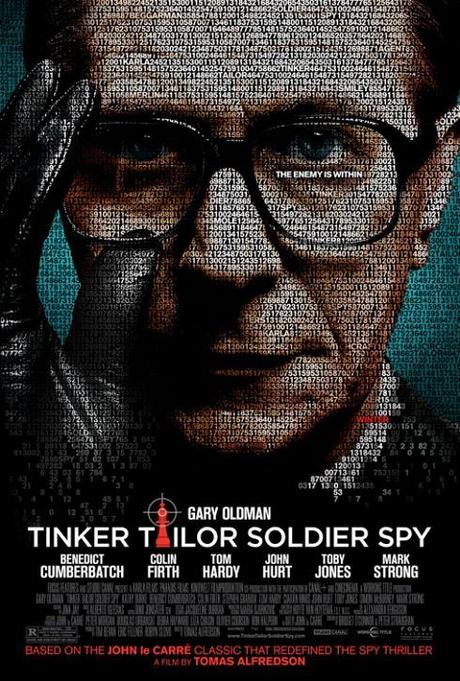
By Jonathan Morris, Antiscribe.com
“A plague on both your houses!
‘Zounds, a dog, a rat, a mouse, a cat, to scratch a man to death!
A braggart, a rogue, a villain, that fights by the book of
arithmetic!
Why the devil came you between us?”
- William Shakespeare, Romeo and Juliet, Act 3, Scene 1
It’s fair to say, I think, that we’ve all been trained by popular culture to think that there’s something thrilling, even sexy, about being a spy. Foreign intrigues, exotic locales, elegant luxuries, strength of purpose, national pride, and beautiful women and/or men who represent the exemplars of their countries’ breeding; all these noble elements are what many of us of would think of when we hear the word “spy.” But these things are not the trappings of a real spy, but a secret agent. Secret agents are works of fictional fun and fantasy; engines of pleasure that assuage us with the notion that the conflicts of nations are just a game played out in the landscapes of someone’s imagination. Spies, though, have always been a sordid, painful reality of the international sphere, and there’s very little that’s sexy about being a spy. Real spies live in a world of pressure and paranoia that can be ugly, dark, and merciless, yet also technocratic, bureaucratic, and banal. A spy who is especially good, especially lucky, or most often, especially ineffectual, might easily make it through their career with their life. It’s unlikely, though, that that life could ever be a happy one.
The new film Tinker Tailor Soldier Spy shows a great understanding of this dark yet oddly functional image of the world of international espionage. Based on John Le Carré’s 1974 novel, and set during that era, Tinker Tailor Soldier Spy take place within the world of Britain’s Secret Intelligence Service, also known as the Circus. As the story begins, the head of the Circus, a man known only as Control (John Hurt) sends one of his agents, Jim Prideaux (Mark Strong), out into the field to recruit a potential Soviet defector, one who might hold knowledge of a mole highly situated within their organization. The meeting, of course, goes wrong; Prideaux is gunned down by the Soviets, and the resulting public embarrassment sees both Control and his second-in-command, George Smiley (Gary Oldman), ousted from their positions in the Circus. Shortly after, another agent trapped out in the field, Ricky Tarr (Tom Hardy), contacts the foreign office, also claiming to have information on the mole. Not knowing whom to trust, the government recruits Smiley to investigate the Circus from the outside, and track down the traitor who may have cost him his job and others their lives.
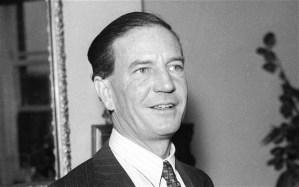
Kim Philby, the Soviet spy who spent twenty-five years as a mole for British intelligence. To this day, twenty years after the fall of the USSR, Philby is still regarded as a hero to the Russian people for his success in infiltrating British foreign intelligence.
The novel and film are both inspired by real events: starting in the 1950s, the British intelligence services were rocked by a series of terrible scandals, not the least of which was the betrayal of a man named Kim Philby. Philby, one of the infamous Cambridge Five, was a Soviet double agent who worked for almost a quarter of a century in British intelligence, ultimately reaching the upper echelons of the international branch of MI6 before being found out in 1963. Because of Philby, numerous British agents saw their identities compromised, and the intelligence services were not only publicly embarrassed but nearly crippled. One of those exposed agents was an individual named David Cornwell, who for a few years before the Philby revelation had begun publishing novels under the name “John le Carré.”
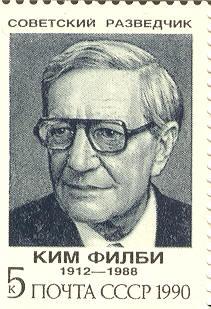
A Soviet postage stamp commemorating Philby, released two years after his death; interestingly, in his latter years he bore more than a slight resemblance to George Smiley...
Informed by his experience in the world of international espionage, le Carré’s influence on spy literature has, in the decades since, been indelible; taking the genre away from the violent and visceral worlds of Ian Fleming and existential narratives of Graham Green, le Carré’s spy novels conveyed a brutal emotional realism and authenticity disconnected from issues of national pride and moral certainty. Le Carré’s literature could often be uncompromisingly bleak, and his heroes were heroic sometimes only because they understood how few differences there were between themselves and the enemy.
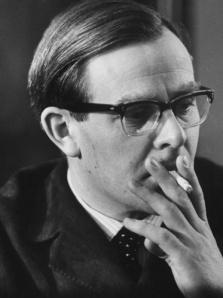
David Cornwell, also known as "John le Carré," circa 1964.
Smiley, le Carré’s most oft-recurring character, was the epitome of this; a bespectacled, unassuming, middle-aged man whose entire personal aura seemed designed to blend into the crowd, Smiley was keenly aware of how amoral he job required him to be, and equally conscious of how his actions didn’t actually make the world a better place. His opposite number, the Soviet spymaster Karla, was his antithesis; a man who Smiley knew could be defeated because he had the convictions of an ideological fanatic.

George Smiley (Gary Oldman), le Carré's most popular hero whose worldview evokes the way his author portrayed Cold War espionage.
To le Carré, there was nothing ideological or idealistic about being a spy, and because of the commonplace tactics of the intelligence community, neither the East nor the West could claim true ethical superiority over the other. Just as Shakespeare stated in the quote above, to le Carré the plague was on both houses, and placing yourself between the two, no matter which side you were allied, meant that your hands and soul would inevitably get soiled. And though not what most would define as a “post-colonial” author, le Carré was definitely post-Empire; James Bond may have conveyed the idea that Britain was still a global superpower, but le Carré’s literature held no such illusions. Le Carré emphasized, perhaps accurately, that the Cold War had reduced Great Britain to being a satellite for the West, a distant secondary player in the conflict against the Soviet Union.
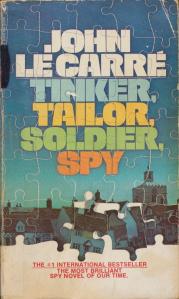
Tinker Tailor Solider Spy may be Le Carré’s most emblematic novel and certainly one of his best, and the film does an extremely fine job simultaneously capturing the mood of its source without substituting for the experience of reading it. Indeed, the novel is a very complex, labyrinthine, layered work of multiple characters and complex jargon that successfully immerses the reader not only in its narrative but its culture. Tellingly, the famed 1978 television adaptation, which starred the late Sir Alec Guinness as Smiley, ran nearly six hours in length. Director Tomas Alfredson and writers Bridget O’Connor and Peter Straughan manage to condense the many narrative threads and numerous characters into a very lean but competently streamlined two hour film. Certainly, many elements of the novel have been altered, but to little true consequence; the film captures the emotional power of its source work, as well as sustains a fair amount of le Carré’s commentary on his world and its culture in as precise a manner as possible.
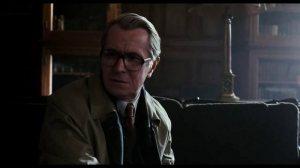
George Smiley in one the film's typically stifling, smoke-filled, atmospheric rooms.
That emotional core of the film, revealingly enough, doesn’t center too much on Smiley. Here Smiley is a fairly taciturn man, one whose entire demeanor is to appear innocuous and even somewhat blank, but who with a word or two can force someone to reveal everything he needs to know from them. As played by the chameleon-like Gary Oldman, Smiley is someone who clearly has a lot of thoughts, emotions, and opinions lying beneath his exterior, but that interior self is rarely revealed. Smiley doesn’t even speak until almost twenty minutes into the film, his narrative purpose being to set up other character’s revelatory dialog. The strength of Oldman is that he portrays Smiley as a man who’s almost always playing some form of emotional and intellectual poker, and due to his untenable position, his chief move is to bluff. Therefore, Oldman’s work here is more a collection of intriguing “tells” than a thorough evocation of deeply held feelings. Though he rarely reveals it, Oldman’s Smiley seethes with feelings of betrayal: betrayal from his country’s government, from his unfaithful wife, and from the mole himself, who has undermined everything Smiley has devoted his life to. It’s a compelling and intricately crafted performance, one that should finally, at the very least, give Oldman the first Academy Award nomination of his career.
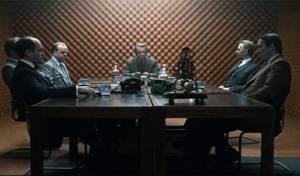
The chief council of the Circus, led by Control in the center (John Hurt); one of these men is the likely Soviet mole...
Where Tinker Tailor Soldier Spy resonates best is within the pathos of its supporting players, the other members of the Circus, all of whom fundamentally lack Smiley’s ability to repress his emotions. The hunt for the mole quickly focuses on the four other leaders of the Circus, each of whom earned a designation from Control based on an old children’s rhyme. There’s Tinker (Toby Jones), Tailor (Colin Firth), Soldier (Ciarán Hinds), and Poor Man (Peter Dencik); besides them, there’s Tarr and Prideaux, the Circus’s field men, and Peter Guillam (Benedict Cumberbatch), an inexperienced young handler who soon becomes Smiley’s right hand man. Each of the men have desires and personal attachments, and even outside of the realm of Smiley’s investigation, are continuously trying to hatch their own plots and plans, most often for personal and professional advancement more that any hope of true accomplishment for their cause or country. For such a complex story, the film adroitly utilizes a cast of brilliant actors with distinct faces, faces being sometimes far easier to keep track of then names. The Circus of this film is very much an industrial workplace, an office culture unto itself with secretaries, punch-clocks, lunch breaks, and copious amounts of paperwork; even the main meeting room of the Circus’s upper echelon, a drab, checkered room, is located within a trailer, giving it the image of something always either under construction in transition.

Peter Guillam (Benedict Cumberbatch) searches for files within the many uninviting chambers of the Circus.
Tomas Alfredson, the Swedish director here brings the “Swedish aesthetic” that has been popularized in recent years, in films like his own Let the Right One In, as well as through the mystery literature of Stieg Larsson, Henning Mankell, and Jo Nesbo. The film’s world is a haunting atmosphere of soulless, colorless rooms of shadows and smoke; even the brief forays into exotic locales, namely Turkey and Hungary, are shot with an eye towards visualizing the inhospitable. Alfredson’s selection of shots and framing grasp the often stifling tension that can exist when people who don’t trust one other are nonetheless forced to work together. Alfredson wisely strips the world of his film of nearly all its glamour and extraneous action, while nonetheless maintaining its elements of danger, intrigue, and drama. This is perhaps a film that somewhat needed the vision of someone who wasn’t British to truly tell honestly. Though it never quite captures the full relevance of history that informed le Carré’s writing, it does demonstrate the sense of hypocrisy that formed so much of Cold War hysteria and nationalism, as well as the unsparing life of ethical compromise that contemporary times have painfully demonstrated as being an ingrained part of international espionage.

George Smiley standing within the bureaucratic, functional environment of the Circus.
While undeniably a strong film, I’m not sure if Tinker Tailor Soldier Spy really ultimately reaches the level of being a great one. In the end, for all its successful evocation of mood and the clarity of characters’ emotion, the film never really brings out that same feeling in us, lacking as it does, a certain resonance. There’s intellectualism and aesthetic vision to spare, with a series of rich character performances, anchored by Oldman’s Smiley, but somehow, the film never ultimately seems to acheive the sum of its parts. It’s not the best film to have been derived from le Carré’s work – that honor belongs to 1965’s The Spy Who Came In From the Cold – but it’s a damn fine one on its own merits; one that should cause someone to think differently the next time someone is called a “spy.”

